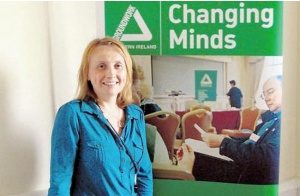Role: Director
Company: Groundwork NI
Track Record:
Sylvia Gordon, director of Groundwork tells, Symon Ross about the work her organisation is doing and why she firmly believes there is still peace-building work to be done in Northern Ireland.
What does your role involve?
At the heart of my role with Groundwork NI is working with local people and partners — using the environment as the catalyst for change.
When I saw my first job with Groundwork advertised in the Belfast Telegraph in 2001, it was that clear message which prompted me to complete an application form.
I have been director now for the last two years and I firmly believe that even though we are a regional organisation working across Northern Ireland, the border counties of the Republic of Ireland and Dublin — we must make that difference locally in north Belfast.
My role involves looking to the future sustainability of Groundwork NI in this challenging climate. It’s about positioning, networking and promoting the diverse range of programmes and services we offer — demonstrating the value of the investments of our funders and making sure the achievements by local people and communities are recognised.
How did you get into the not-for-profit sector in the first place?
My first job in the not-for-profit sector was with the Northern Ireland Tenants Action Project in Ballymena in 1996. It wasn’t a conscious decision to work for a charity — it was a job that I knew I could do.
Since then I have worked with other not-for-profits and for a time I was the chair of Women’s Aid in parts of County Antrim and am currently on the board of the Community Relations Council.
The work is both extremely rewarding and can be very challenging.
Did you always want to work in a community-focused job?
I have always wanted to work with people, not for people. I am fortunate that my position allows me to work with people committed to making a better and more peaceful future for Northern Ireland. It’s empowering for me to see projects coming to realisation through the vision and imagination of local people — that’s the distinct offer that Groundwork NI makes; the regeneration of, more often than not, contested sites and supporting the people in the process.
What training or previous experience do you have that has helped in your current role?
That’s the one thing about the not-for-profit sector: there is investment in training and professional development for people.
I believe what has helped me most is believing in myself and trusting in others. I listen, I take advice, I build consensus — whenever possible — and make decisions. Groundwork NI has a team of people with a diverse range of skills and experience that I value.
What is the vision of the organisation you work for?
The vision for Groundwork NI is of a peaceful society made up of vibrant, healthy and safe communities, which respects the local and global environment and where people and enterprise prosper.
We are an outcome driven organisation and we provide open spaces and physical assets that contribute to health and wellbeing that underpin sustainable communities and work towards shared space.
We’re committed to delivering the best programmes and services possible for communities.
And what does that actually translate to in terms of the work Groundwork NI does on a day-to-day basis and your own role?
It translates into many projects involving over a hundred partners. Current programmes include the Re-Imaging Communities Programme to replace sectarian images with artwork reflecting a more profound culture and shared history. The Greencare North West Programme is concerned with community and biodiversity projects.
Do you think there is still a lot to do in terms of peace building and regeneration in Northern Ireland?
We have come some way, but there is a lot more to be done towards systemic change in Northern Ireland.
The most disadvantaged and marginalised working-class communities now, are the same identified 30years ago. The peace dividend has still to be delivered in these communities.
It is a tough time for charities to secure funding — why is it important that the work you do is sustained for the long-term?
It’s important because of the evidence of a huge social return on our relatively small capital investments — that’s particularly important as we head towards tougher times.
Groundwork NI is making sure our offer is relevant to the communities we serve and aligned to their needs and, where possible, government policy. Our partners also say we are an approachable, honest broker.
What sort of personality and qualities do you need to do your job successfully?
I’m driven by the work of Groundwork and committed to what we do. I would say I’m highly motivated and resilient and I would like to think I lead by example and inspire others.
What are the biggest rewards of the job? And the biggest challenges?
It’s witnessing the impact of our projects. Every day I pass the Mount Sports Zone in north Belfast — one of my first — and there are children and young people in there having fun and kicking or lobbing a ball. The biggest challenge is protecting work like this in a climate of stringent cuts.
What is the best piece of advice you’ve ever been given?
Learn from your mistakes — of which there have been plenty, but never catastrophic.
What advice would you give to someone who wanted to work in the charity/community sector?
A proven commitment to the charity sector is important. Start by getting voluntary experience, whether in your own community or within a charity. If there is a cause you feel passionately about try and get some experience of that cause.
What do you enjoy doing outside of work?
Spending time with Niamh, my four-year-old granddaughter and catching up with friends and family. I enjoy exercise and just this Sunday past, my friend Janine encouraged me on a run through Glenariff Forest Park.


